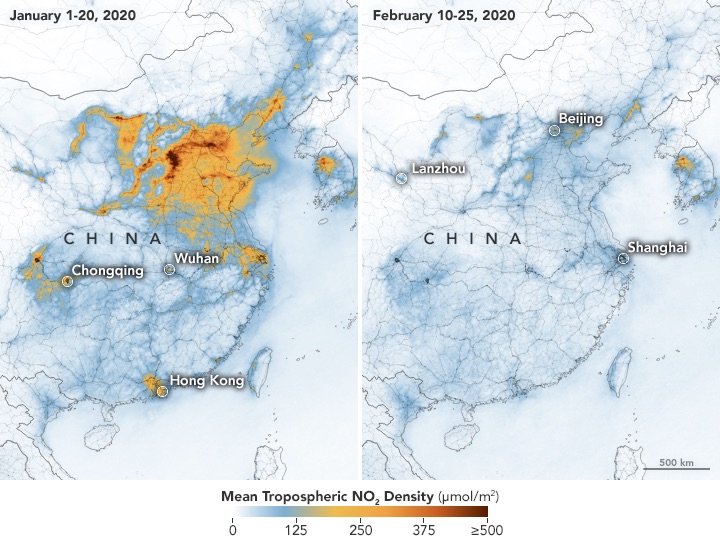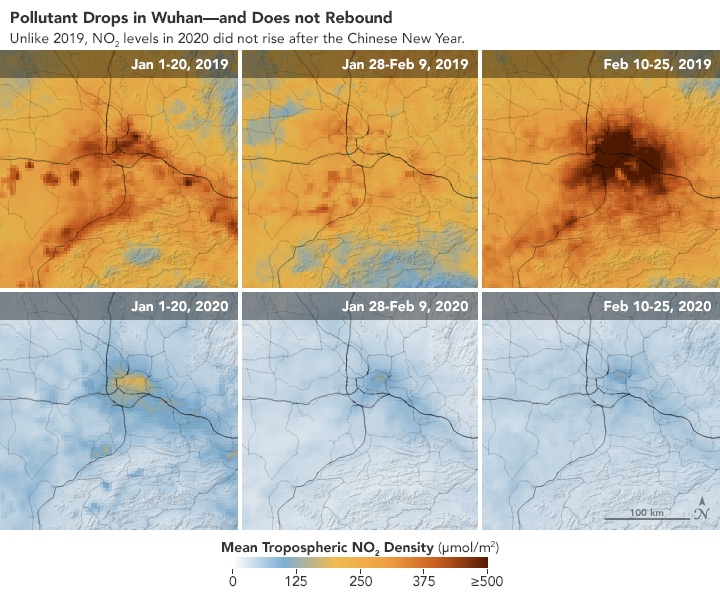The number of confirmed COVID-19 cases worldwide continues to increase, now with a total of 110,416 cases, according to the tally of Johns Hopkins CSSE as of March 9. Mainland China remains to be the country with the highest number of infected, now amounting to 80, 552.
Unexpected decline
During this economic slowdown in the country, satellites from NASA and European Space Agency (ESA) have observed something that may be of interest— significant declines in the nitrogen dioxide (NO2) levels.
The heat map above was generated based on the information collected by the Sentinel-5P, an observation satellite from ESA. In Sentinel-5P is a device known as the Tropospheric Monitoring Instrument (TROPOMI) which makes the collection possible.
These two spatio-temporal maps encompass data collected from January 1-20 (pre-quarantine period) and February 10-25 (post-quarantine period) respectively.
From our partners:
The heat map visualises for us the mean tropospheric NO2 density in China between the two time intervals. NO2 is a toxic gas emitted by motor vehicles, power plants, and other industrial facilities. The closer the color is to red, the higher the NO2 density is.
As we can see, in January, the NO2 concentrations were high in cities like Shanghai and Beijing. However, after about a month with the COVID-19 outbreak in the background, the NO2 levels even in these highly industrialized areas were virtually neutralised.
“This is the first time I have seen such a dramatic drop-off over such a wide area for a specific event,” according to NASA Goddard Space Flight Center air quality researcher Fei Liu.
According to NASA, experts have already observed similar declines in the area during the 2008 economic crisis as well as the 2008 Olympics and Lunar New Year.
However, during the time of the economic crisis, this change was gradual. On the other hand, the decline was only good for the duration of the event in the case of the 2008 Olympics and the Lunar New Year celebrations.
The epicenter
In the epicenter of the outbreak, Wuhan, the decrease in pollutant levels are extremely pronounced.
The heat map above shows the NO2 levels in Wuhan From January to February of 2019 in the upper row. Imposed below it are the heat maps from January to February of the present year for comparison.
It is evident that there is a link between the COVID-19 outbreak and the drops in pollutant levels in the area. Apart from this, the striking change was also partly due to the environmental regulations implemented by China the previous years.
No rebounding effects
Normally, the low levels of NO2 near the end of January and the beginning of February which coincides with the Lunar New Year celebrations rebounds right after. However, NASA noted that this decrease is too high of a magnitude to be only due to the commemoration.
“This year, the reduction rate is more significant than in past years and it has lasted longer. I am not surprised because many cities nationwide have taken measures to minimize spread [sic] of the virus,” Liu said.
This decline in pollutants is undeniably beneficial for citizens. The pollution levels in China, for instance, compels the residents to wear face masks to filter out smog.
This drastic drop in air pollution does not imply that we have to paralyze economies in order to attain clean air. If there is any takeaway from this observation of NASA and ESA, it is the effectiveness of regulating emissions in reducing the contamination of our air. This observation from the satellites is a reminder for us that attaining our climate targets is an achievable goal if we are proactive enough to regulate our emission contributions.















